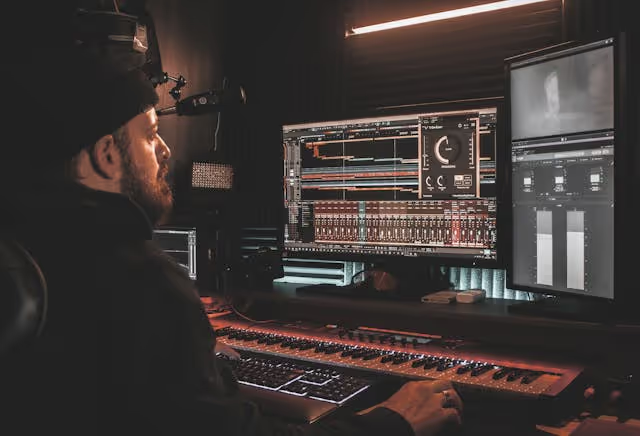

On our courses, you’ll get hands-on with the best kit, take advantage of our widespread industry contacts, and perform and crew at exciting live events throughout your degree.
The course curriculum balances theoretical study alongside practical application. Throughout the course you’ll be challenged to develop your decision-making in new, and at times, complex and unpredictable contexts. The content of the course also closely reflects current working practices in industry, and aims to prepare you for work in a highly competitive workplace. Students in audio and music technology will increasingly be faced with freelance and self-employed models of work upon graduation.

Introduction to the Studio:
You will begin your journey into the studio environment by developing your understanding of the fundamentals of recording. You will learn about large format consoles, signal flow, connections, microphone types, and DAWs to record audio.You’ll be able to apply these skills whether you’re in a traditional studio or have a small home set up: get this right now, and it will set you up for all of your future studio work.
Studio Practice:
In this module, you’ll discover the magic of recording various artists using different styles of recording such as multitracking and overdubbing, in session and in your own time, to form a portfolio of studio work.
Sound and Audio Fundamentals:
In this module, you will experience the core principles of the subject area, in order to understand fundamental theory and how this can be applied to the relevant technology in this field. Areas such as sound wave principles, audio signals, analysis tools and industry standards will be developed, both in understanding and application.
Studio Production :
You will explore digital, analogue, and hybrid studio technologies, developing recording and processing techniques to take on a variety of productions over the module: this could be using traditional studio environments (on-site or external) or your own DIY production set ups.You will collaborate with performers, artists, and other students to work on a wide base of genres, selecting a range of your productions for a portfolio that should be approaching commercial standards.
Audio for Games:
In this module you will develop your sound design and implementation skills, for games, using a range of industry-standard software and techniques. You will create in-game audio content for objects, such as weapons, vehicles, ambience, and user interfaces.You will develop a personal showreel that will showcase your audio for games skills, which will support your employability in the industry.